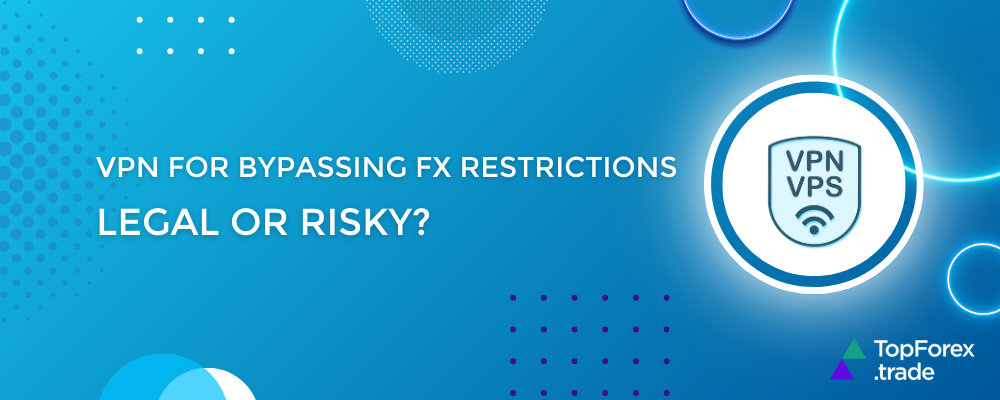Using VPNs to bypass Forex trading restrictions: what is allowed and what is risky?

Forex trading is a global market, but not everyone has equal access. Many countries impose restrictions on Forex trading, either by limiting broker access or outright banning it. In response, traders often turn to Virtual Private Networks (VPNs) to bypass these restrictions and continue trading.
But is using a VPN for Forex trading a smart move or a legal nightmare? While VPNs offer privacy, security, and the ability to access blocked platforms, they also come with potential risks – ranging from account bans to legal consequences depending on where you trade. In this article, we’ll explore whether using a VPN for Forex trading is legal or risky, what you should watch out for, and which VPNs work best for traders.
Why do traders use VPNs for Forex?
A VPN masks your real location, rerouting your connection through a secure server in another country. Traders use VPNs for:
✅ Enhancing security – VPNs encrypt data, protecting traders from hacking, identity theft, and ISP tracking.
✅ Preventing ISP throttling – Some internet providers slow down trading platforms, but a VPN hides trading activity to maintain speed.
✅ Accessing Forex platforms while traveling – Traders can securely log in to their accounts from different regions.
✅ Bypassing restrictions (with caution) – In some cases, traders use VPNs to access brokers blocked in their region. However, this may violate broker policies or local regulations, so it’s important to check the rules before proceeding.
➡ Check out: Top 5 reasons to use VPN in Forex trading
Is it legal to use a VPN for Forex trading?

VPNs are legal in most countries, but the way you use them matters. Let’s break it down:
Where VPN use for Forex trading is generally safe
Using a VPN is usually fine in countries where Forex trading is legal and brokers accept international clients. For example:
- The UK, Canada, Australia, and most of Europe allow Forex trading freely. Using a VPN here is typically for privacy, not bypassing restrictions.
- Offshore trading hubs like the Bahamas or Seychelles have fewer regulations, and traders often use VPNs for security rather than access.
Where VPN use can be risky
- Forex trading in the U.S. is legal but heavily regulated. U.S. residents can only trade with brokers registered with the CFTC and NFA. Using a VPN to trade with offshore brokers may violate U.S. law.
- China – Forex trading through offshore brokers is restricted. VPNs are also heavily monitored, and unauthorized VPN use can result in penalties.
- India – The Reserve Bank of India (RBI) has strict Forex rules. Using a VPN to access offshore brokers can lead to legal issues.
- Middle Eastern countries – Nations like UAE and Saudi Arabia regulate Forex trading heavily. VPNs might help access brokers but could also attract scrutiny.
➡ More about: Top VPN locations for Forex trading + best VPNs for traders
Where VPNs are banned or restricted
Some countries completely ban or restrict VPNs:
- North Korea, Iraq, Turkmenistan – Strict bans on VPN usage.
- Russia, China, UAE, Egypt – Heavy restrictions and monitoring on VPNs, with fines for unauthorized use.
👉 Bottom line: If your country bans Forex trading, using a VPN to bypass the restriction could be illegal. Always check local laws before using one.
When is it safe to use a VPN for Forex?

Using a VPN for Forex trading is safe and legal in the following cases:
✔️ You live in a country where Forex trading is legal – If Forex is allowed but you want extra security or privacy, using a VPN is fine.
✔️ You travel frequently – A VPN ensures you can access your broker’s platform securely from different countries.
✔️ Your broker allows VPNs – Some brokers don’t mind VPN use, especially if it’s for security rather than bypassing restrictions.
✔️ You want to avoid tracking – A VPN keeps your data private from internet providers or third parties.
Risks of using VPNs to bypass Forex trading restrictions
🚨 Broker account suspension – Many brokers track IP addresses and may block or freeze accounts if they detect VPN use, suspecting fraud.
🏛 Legal issues – In some countries, using a VPN to trade with offshore brokers can lead to fines, legal action, or blocked transactions.
⚠️ KYC and withdrawal problems – Brokers require proof of residence. A VPN may cause issues with verification and withdrawals.
🔓 Weak or fake VPNs – Free or low-quality VPNs can expose your data, track activity, or fail to bypass restrictions.
Best VPN for FX trading
If you decide to use a VPN for security and privacy (not to break laws), here are the best options:
NordVPN for FX – Best VPN overall
✔️ High-speed servers in 118+ countries
✔️ Double VPN encryption for extra security
✔️ No logs, preventing tracking by brokers or ISPs
✔️ Works well with MetaTrader, cTrader, and WebTrader
Surfshark VPN for FX – Best for unlimited devices
✔️ Affordable and secure with a no-log policy
✔️ Unlimited device connections (great if you trade on multiple devices)
✔️ Camouflage Mode hides VPN use, preventing broker detection
ProtonVPN for FX – Best VPN for privacy
✔️ Swiss-based with strict privacy laws
✔️ No-logs policy and strong encryption
✔️ Secure Core technology routes traffic through extra-secure servers
ExpressVPN for FX – Best for speed
✔️ Fast servers in 100+ countries, great for low-latency trading
✔️ TrustedServer technology (no data storage)
✔️ Works reliably in restricted regions like China
PureVPN for FX – Best for global trading
✔️ Large server network (6,500+ servers worldwide)
✔️ Dedicated IP option to avoid VPN detection
✔️ Strong encryption for secure Forex trading
Related articles:
VPNs to avoid FX trading restrictions - FAQ